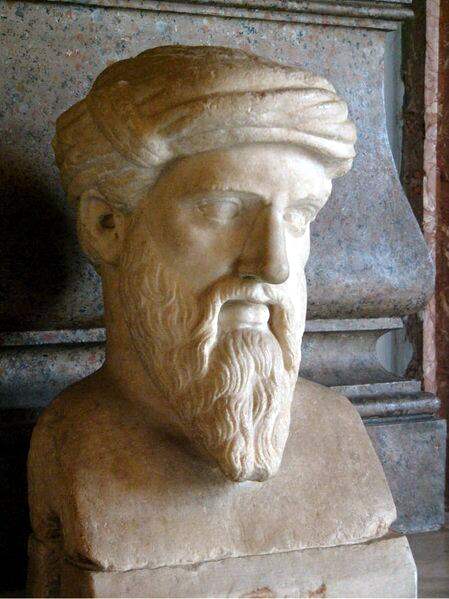Plato(428/427 BC -399 BC {71 Years})
He was the king of thoughts. His thinking power and perspective of observing thing was different from others. He was an Athenian Philosopher during classical period in Ancient Greece. He was one of the very important figure in Ancient Greece. He was the founder of Western religion and Spirituality.
His contribution in Ancient time was phenomenal.:-
- Influenced By Pythgoras
- Mathematician
- MetaPhysics
- Epistemology
- Ethics
- Politics
- Art and Poetry
- Dialogues and Dialectic
Platonism
The following excerpt may be representative of Plato's middle period metaphysics and epistemology:
[Socrates:] "Since the beautiful is opposite of the ugly, they are two."
[Glaucon:] "Of course."
"And since they are two, each is one?"
"I grant that also."
"And the same account is true of the just and unjust, the good and the bad, and all the forms. Each of them is itself one, but because they manifest themselves everywhere in association with actions, bodies, and one another, each of them appears to be many."
"That's right."
"So, I draw this distinction: On one side are those you just now called lovers of sights, lovers of crafts, and practical people; on the other side are those we are now arguing about and whom one would alone call philosophers."
"How do you mean?"
"The lovers of sights and sounds like beautiful sounds, colors, shapes, and everything fashioned out of them, but their thought is unable to see and embrace the nature of the beautiful itself."
"That's for sure."
"In fact, there are very few people who would be able to reach the beautiful itself and see it by itself. Isn't that so?"
"Certainly."
"What about someone who believes in beautiful things, but doesn't believe in the beautiful itself and isn't able to follow anyone who could lead him to the knowledge of it? Don't you think he is living in a dream rather than a wakened state? Isn't this dreaming: whether asleep or awake, to think that a likeness is not a likeness but rather the thing itself that it is like?"
"I certainly think that someone who does that is dreaming."
"But someone who, to take the opposite case, believes in the beautiful itself, can see both it and the things that participate in it and doesn't believe that the participants are it or that it itself is the participants--is he living in a dream or is he awake?
"He's very much awake."
(Republic Bk. V, 475e-476d, translation G.M.A Grube)
Books
Plato's Republic: A Study
Read And Download
In this book a distinguished philosopher offers a comprehensive interpretation of Plato’s most controversial dialogue. Treating the Republic as a unity and focusing on the dramatic form as the presentation of the argument, Stanley Rosen challenges earlier analyses of the Republic (including the ironic reading of Leo Strauss and his disciples) and argues that the key to understanding the dialogue is to grasp the author’s intention in composing it, in particular whether Plato believed that the city constructed in the Republic is possible and desirable.Rosen demonstrates that the fundamental principles underlying the just city are theoretically attractive but that the attempt to enact them in practice leads to conceptual incoherence and political disaster. The Republic, says Rosen, is a vivid illustration of the irreconcilability of philosophy and political practice.
Author(s): Professor Stanley Rosen
Publisher: Yale University Press, Year: 2005
ISBN: 9780300109627,0-300-10962-8
Author(s): Professor Stanley Rosen
Publisher: Yale University Press, Year: 2005
ISBN: 9780300109627,0-300-10962-8
Download
Memories
He was also a Wrestler
In Rome
More about PLATO
You can read more about his lifestyle:-
- Early life
- Memories
- Philosophy
- Ethics
- Dialogue



_(14767984254).jpg/927px-Greek_athletic_sports_and_festivals_(1910)_(14767984254).jpg)
.png)


0 Comments